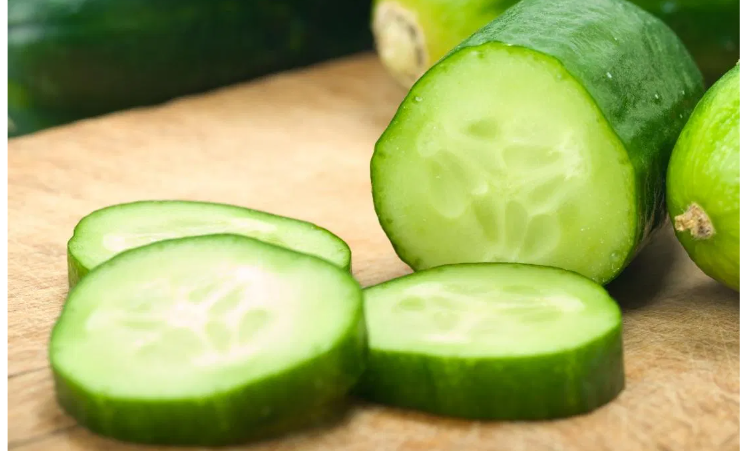HIDDEN BENEFITS OF CUCUMBER
The cucumber is a member of the Cucurbitaceae family. Other members of the family include squash and different kinds of melon, including bitter melon.
Cucumbers (vicious sativus)have a mild, refreshing taste and a high water content. They can help relieve dehydration and are pleasant to eat in hot weather.Cucumbers provide various nutrients but are low in calories, fat, cholesterol, and sodium.
People eat cucumber as a savory food, but it is a fruit. It also features in some beauty products.

This article looks at the nutritional content of cucumber, its possible health benefits, Nutritional facts of cucumber, and any potential health risks.
Benefits
The nutritional profile of cucumbers may give them a number of health benefits.
1.HYDRATION
Cucumbers consist mostly of water, and they also contain important electrolytes. They can help prevent dehydration in hot weather or after a workout.
For people who do not enjoy drinking water, adding cucumber and mint can make it more attractive.
Staying hydrated is essential for maintaining a healthy intestine, preventing constipation, avoiding kidney stones, and more.
Cucumber is one of the most hydrating foods.
2.RICH IN ANTIOXIDANTS
Cucumbers can often act as antioxidants when consumed along with processed foods and high sugar foods. Month-long consumption of cucumber powder shows improvement in the body’s antioxidant activities. This helps in fighting oxidative damage and improves overall health
3.CANCER
As a member of the Cucurbitaceae family of plants, cucumbers contain high levels of bitter-tasting nutrients known as cucurbitacin.
According to an article in the International Journal of Health Services, cucurbitacins may help prevent cancer by stopping cancer cells from reproducing.
A 133-g cup of chopped cucumber with its skin also provides around 1 g of fiber. Fiber may help protect against colorectal cancer.
4.BONE HEALTH
Vitamin K helps with blood clotting, and it may support bone health.
A 142-gram (g) cup of chopped, unpeeled, raw cucumber provides 10.2 micrograms (mcg) of vitamin K, according to the United States Department of Agriculture (USDA).
Cucumber also contains 19.9 milligrams (mg) of calcium. Adults need 1,000–1,200 mg of calcium a day, depending on sex and age.
Vitamin K helps improve calcium absorption. Together, these nutrients can contribute to good bone health.
Vitamin D is also important for bone health.
5.CARDIOVASCULAR HEALTH
The American Heart Association (AHA) note that fiber can help manage cholesterol and prevent related cardiovascular problems.
A 142-g cup of unpeeled cucumber also provides 193 mg of potassium and 17 mg of magnesium. The Dietary Guidelines recommend that adults consume 4,700 mg of potassium each day and 310–410 mg of magnesium, depending on sex and age.
Reducing sodium intake and increasing potassium intake may help prevent high blood pressure.
The cucurbitacins in cucumber may also help prevent atherosclerosis
6.SKIN CARE
Cucumber is rich in silica, which is an essential component that aids in developing strong and healthy connective tissues in the muscles, ligaments, tendons, cartilage, and bones. Doctors often recommend cucumber juice because of the silica content for healthier and brighter skin. Cucumber’s high water content makes it naturally hydrating. The extract of cucumbers is often used topically for treating various types of skin ailments like sunburn and under-eye swelling, due to its rich antioxidant content. It may also be recommended to assist in the treatment of other skin ailments like psoriasis, eczema, and acne.
7.CONTROLS BLOOD PRESSURE
Consuming foods high in magnesium, potassium, and fiber were key. The same research also mentions cucumbers as a part of the potassium food group, thereby contributing to controlling blood pressure.
8.MANAGES DIABETES
Cucumbers have been used for assistance with glucose control in people with diabetes. They possess a hormone required by the beta cells during insulin production.
The presence of carbohydrates and their impact on the body is measured by the glycemic index (GI). Glycemic Index measures how carbohydrates contribute to raising glucose (or blood sugar) levels. Every food item contains essential nutrients in different percentages. The glycemic index (GI) of cucumbers is zero, meaning that it is a good choice for diabetic patients and, thus, can help keep the glucose level in check.
NUTRITION FACTS
Cucumber, with peel, raw
Serving Size : 100 g
1 cup slices (52 g)
1 cucumber (8-1/4")
(301g)NutrientValueWater
95.23Energy [kcal]
15Energy [kJ]
65Protein [g]
0.65Total lipid (fat) [g]
0.11Ash [g]
0.38Carbohydrate, by difference [g]
3.63Fiber, total dietary [g]
0.5Sugars, total including NLEA [g]
1.67Sucrose [g]
0.03Glucose (dextrose) [g]
0.76Fructose [g]
0.87Maltose [g]
0.01Starch [g]
0.83Calcium, Ca [mg]
16Iron, Fe [mg]
0.28Magnesium, Mg [mg]
13Phosphorus, P [mg]
24Potassium, K [mg]
147Sodium, Na [mg]
2Zinc, Zn [mg]
0.2Copper, Cu [mg]
0.04Manganese, Mn [mg]
0.08Selenium, Se [µg]
0.3Fluoride, F [µg]
1.3Vitamin C, total ascorbic acid [mg]
2.8Thiamin [mg]
0.03Riboflavin [mg]
0.03Niacin [mg]
0.1Pantothenic acid [mg]
0.26Vitamin B-6 [mg]
0.04Folate, total [µg]
7Folate, food [µg]
7Folate, DFE [µg]
7Choline, total [mg]
6Betaine [mg]
0.1Vitamin A, RAE [µg]
5Carotene, beta [µg]
45Carotene, alpha [µg]
11Cryptoxanthin, beta [µg]
26Vitamin A, IU [IU]
105Lutein + zeaxanthin [µg]
23Vitamin E (alpha-tocopherol) [mg]
0.03Tocopherol, beta [mg]
0.01Tocopherol, gamma [mg]
0.03Tocotrienol, alpha [mg]
0.04Vitamin K (phylloquinone) [µg]
16.4Fatty acids, total saturated [g]0.0414:0 [g]0.0116:0 [g]0.0318:0 [g]
0.01Fatty acids, total monounsaturated [g]0.0118:1 [g]
0.01Fatty acids, total polyunsaturated [g]0.0318:2 [g]0.0318:3 [g]
0.01Phytosterols [mg]
14Tryptophan [g]
0.01Threonine [g]
0.02Isoleucine [g]
0.02Leucine [g]
0.03Lysine [g]
0.03Methionine [g]
0.01Cystine [g]
0Phenylalanine [g]
0.02Tyrosine [g]
0.01Valine [g]
0.02Arginine [g]
0.04Histidine [g]
0.01Alanine [g]
0.02Aspartic acid [g]
0.04Glutamic acid [g]
0.2Glycine [g]
0.02Proline [g]
0.02Serine [g]
